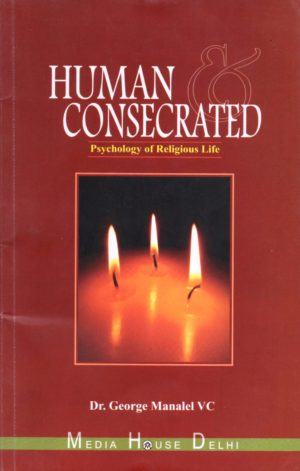Description
Let us know the Author Dr. Felix Podimattam OFM Cap.
Dr. Felix Podimattam is one of the best known Indian authors in the field of ethics and morality. He holds a Master’s degree in Political Science from the University of Mysore, a Licentiate degree in theology from Pontifical Gregorian University, Rome and a Doctoral degree in Moral Theology from the Alphonsian Academy, Rome. His doctoral thesis ‘The Relativity of Natural Law’ is acclaimed as exceptionally excellent. The thesis was guided by the eminent Moral Theologian, Bernard Haering, who influenced the renewal of Moral teachings of the Church during and after the Vatican II. Dr. Podimattam is resident professor at St. Francis Theological College, Kottayam and has been the founding member and first president of the Indian Moral Theologians Association. Most of his books, numbering over 120, are published by Media House, Delhi. Having gone through most of his books, let me highlight the most significant characteristics of his writings. First of all, he engages in a creative dialogue with other authors on every topic of discussion. Second, he tries to compare and integrate, as far as possible, the visions and views of other religions. Third, he holds a very positive attitude to life in general, especially to human body, sexuality, etc. Fourth, he is a keen observer of the socio-political and religious happenings in the society and responds to them immediately. His book on ‘Fast unto death’ during the upheaval of fisher people’s struggle in the eighties and his book on ‘Da Vinci Code’ a few years ago, where he gives a theological response to journalism with half-truths, are worth mentioning here. Fifth, he has taken keen interest on equal rights and dignity to women in the Church as well as in the society. In the context of widespread discrimination against women in the Church and society he published a six-volume work titled: ‘In praise of the woman’. Sixth, he holds on to the sacredness of life in all its forms and he has published books on topics like abortion, euthanasia, etc. Seventh, we find in his writings a harmonious blending of the traditional wisdom with its emphasis on fundamental Christian values as well as the findings of modern sciences like psychology, sociology, anthropology, etc, as well as the latest fruits of biblical exegesis.
The latest contribution of Dr. Podimattam, which may be acclaimed
The Making of a Masterpiece
The latest contribution of Dr. Podimattam, which may be acclaimed as his masterpiece, is: The Ten Commandments in the Law of Christ, a 20 volume work on the Decalogue. His vast knowledge on the subject gained through painstaking research, his teaching experience in various theological institutes stretching out over four decades and frank discussions with eminent thinkers have gone into this work. These books provide us with a re-interpretation of the commandments keeping in mind the genuine concerns of the people of God and at the same time remaining absolutely loyal to the teaching of Christ – “Christ did not come to abolish the law and the prophets, but to fulfil them”.
CONTENTS
INTRODUCTION
1. WORSHIP THROUGH
REVERENCE FOR GOD’S NAME.
1.1. The Concept of ‘Name’ in the Old Testament
1.2. The ‘Name of God’ in Biblical Thought
1.3. The Proper Use of God’s Name
1.4. The Wrong Use of God’s Name
1.5. A Deeper Demand Implied in the Second Commandment
2. WORSHIP THROUGH PRAYER
2.1. Nature’of Prayer
2.1.1. The Essence of Prayer
2.1.2. Prayer in Relation to the Virtues
2.2. Species of Prayer
2.2.1. Cultal, Apostolic, and Mystical Prayer
2.2.2. Active and Passive Prayer
2.2.3. Silent Prayer and Vocal rayer
2.2.4. Communitarian Prayer and Private Prayer
2.2.5. Informal Prayer, Formal Prayer, Prayer Formulas
2.2.6. Prayer of Praise, Thanksgiving, and Petition
2.2.7. Prayer Prescribed?
3. WORSHIP THROUGH THE SACRAMENTS
3.1. Notion and Function of the Sacraments
3.2. Necessity and Obligation of Sacramental Worship
3.3. Dispositions for Valid and Fruitful Reception
3.4. Requirements for Valid and Worthy Administration
4. WORSHIP THROUGH VOWS
4.1. Meaning of the Vow
4.2. Conditions for Valdity
4.2.1. Conditions on the Part of the Person Making the Vow
4.2.2. Conditions on the Part of the Object
4.2.3. Conditions on the Part of the Church
4.3. Binding Force and Fulfillment
4.4. Release from Vows
4.4.1. Commutation
4.4.2. Cessation for Intrinsic Reasons
4.4.3. Dispensation
4. 4.4. Annulment
5. WORSHIP THROUGH CONSECRATION
OF TIME BY HOLY DAYS
5.1. Biblical Origin of the Sunday Celebration.
5.1.1. The Day of the Lord in the Old Testament
5.1.2. The Day of the Lord in the New Testament
5.1.3. The Day of the Lord in Theology
5.1.4. The Binding Force of the Day of the Lord
5.2. Sunday Celebration Pastoral Theologically Considered
5.3. Sunday Rest ‘
5.3.1. Theological Aspects of Sunday Rest
5.3.2. Moral Aspects of Sunday Rest
5.3.3. Pastoral Aspects of Sunday Rest
5.4. Days of Religious Fast and Abstinence
6. WORSHIP THROUGH POPULAR DEVOTIONS
6.1. What are Popular Devotions?
6.2. Theological Reflections on Popular Devotions
6.2.1. Popular Devotions as an
Experience of the Divine
6.2.2. Popular Devotions as a Form of Lay Spirituality
6.3. Psychological Reflections on Popular Devotions
6.4. Spiritual Reflections on Popular Devotions
6.5. Social Reflections on Popular Devotions
6.6. Cultural Reflections on Popular Devotions
6.7. Scientific Reflections on Popular Devotions
6.8. Pastoral Reflections on Popular Devotions
7.WORSHIP THROUGH VENERATION OF SAINTS
7.1. Honoring Others is Natural
7.2. Honoring Saints
7.3. The Need for a Reinterpretation of ilonoring Saints
7.4. Karl Rahner on Honoring Saints
CONCLUSION
BIBLIOGRAPHY
END NOTES




Reviews
There are no reviews yet.